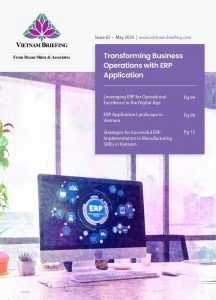In recent years, digital transformation has rapidly expanded across various sectors in Vietnam as businesses aim to boost operational efficiency. This shift has spurred the adoption of ERP systems, which provide a centralized data platform for all business activities, facilitating automated workflows and informed strategic decision-making.
As the usage of ERP applications rises in the Asia-Pacific region, Vietnam’s market is swiftly evolving, with a projected market value of US$49.4 million in 2024 and an expected robust CAGR of 8.5 percent until 2030. Coupled with the country’s commitment to Industry 4.0, this trend is poised to further escalate the demand for ERP systems.
Successfully implementing an ERP system requires a thoughtful strategy to navigate various challenges and maximize the advantages these tools provide. Companies must efficiently manage costs while dedicating time and effort to training and aligning with the international standards these systems follow.
However, these challenges can be effectively addressed through the incorporation of emerging technologies such as cloud computing, artificial intelligence (AI), and the Internet of Things (IoT) into modern ERP systems.
Moreover, the growing trend of industry-specific functionality in ERP applications now provides customized solutions for the distinct challenges faced by various sectors, including food and beverage (F&B), healthcare, retail, and manufacturing. It allows small and medium enterprises (SMEs) to leverage these innovative tools, enhancing their operations despite limited resources.
With the Transforming Business Operations with ERP Application magazine, we aspire to develop a comprehensive resource for executives, IT leaders, and entrepreneurs aiming to leverage ERP systems for sustained competitiveness and digital resilience. The magazine covers the essentials of ERP systems, spotlights the growth of Vietnam’s ERP market fueled by SME adoption and governmental support, and examines tailored ERP solutions for manufacturers to tackle industry-specific challenges.














